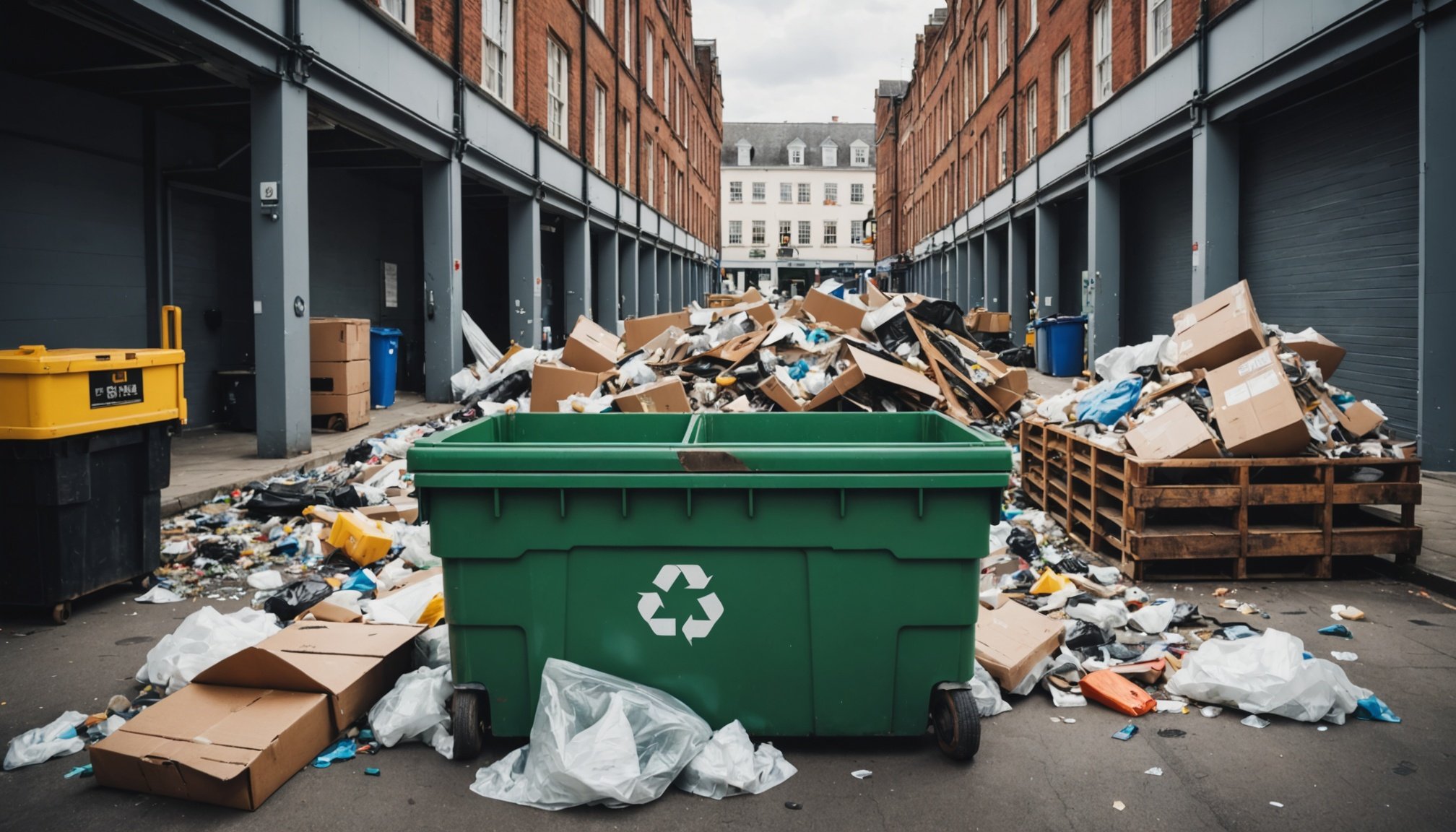Understanding UK Waste Management Regulations
The UK waste management regulations are crucial for establishing a sustainable recycling ecosystem. Key legislation in the UK primarily includes the Environmental Protection Act 1990, which sets out the framework for managing waste, ensuring environmentally sound disposal, and promoting waste reduction. Compliance with these rules is especially pivotal for recycling startups aiming to innovate while adhering to legal and environmental standards.
Compliance isn’t merely a legal obligation; it’s a cornerstone for building trust and maintaining reputation. Startups that align themselves with these regulations can avoid hefty fines and operational disruptions. Regulatory stakeholders involved encompass governmental bodies like the Environment Agency, which are responsible for enforcing the regulations, and local authorities that oversee waste collection and disposal.
Also to discover : Navigating Ethical AI and Data Privacy: A Crucial Guide for UK Startups in the AI Arena
These stakeholders ensure that recycling startups adhere to waste management compliance by providing guidance, monitoring activities, and occasionally incentivizing improved practices. For young businesses, understanding and fulfilling these regulations is both a challenge and an opportunity to establish themselves as responsible, forward-thinking organizations. A proactive approach can significantly bolster a startup’s commitment to sustainable and ethical waste handling and recycling practices.
Compliance Requirements for Recycling Startups
Understanding the recycling compliance requirements is crucial for businesses in this sector. Startups must navigate several layers of regulations to ensure they operate legally and sustainably. Key aspects include obtaining the necessary licenses and permits, upholding the duty of care, and adhering to environmental standards.
In the same genre : How to Successfully Establish a UK Social Enterprise to Combat Plastic Waste
Licensing and Permitting
Recycling startups must acquire the appropriate licenses to conduct their operations. This involves a detailed application process to demonstrate capability and intent to comply with legal standards. Authorities evaluate applications to determine the startup’s impact on the environment and its operational readiness.
Environmental Permits
Environmental permits are vital to maintaining legal and sustainable operations. They establish the conditions under which recycling activities can proceed, setting limits on pollution and mandating waste handling procedures. Startups must ensure their processes align with environmental protection goals.
Duty of Care
The duty of care requires startups to responsibly manage and dispose of waste. This obligation extends across the entire waste management lifecycle, ensuring waste transfer only to authorised handlers and maintaining records to verify compliance. Adhering to duty of care not only supports legal compliance but also promotes a business’s reputation for sustainable practices.
Best Practices for Successful Compliance
Incorporating best practices in waste management is essential for ensuring successful compliance within the UK waste management regulations. Startups can begin by developing an internal compliance team or hiring an advisor dedicated to navigating these complex rules. This team will be responsible for understanding the evolving landscape and ensuring the company’s operations are aligned with legal requirements.
Regular staff training forms the backbone of effective waste management practices. Workshops and seminars should be organised to keep staff updated on the latest regulations and industry standards. This not only boosts compliance but also enhances the team’s ability to tackle potential issues proactively.
Recordkeeping and reporting are crucial components of maintaining compliance. Accurate records demonstrate adherence to regulations and can be presented during audits. Implementing a structured system to log waste handling activities ensures transparency and reduces the risk of non-compliance.
Embracing these practices fosters a culture of responsibility and preparedness, ultimately positioning startups as reliable players in the sustainable waste management sector. By prioritising compliance and ethical waste practices, businesses solidify their reputations while contributing to broader environmental goals.
Navigating Challenges in Waste Management Compliance
Navigating the challenges in waste management compliance is vital for recycling startups to achieve sustainability and legal conformity. Understanding common compliance pitfalls can prevent costly errors. Such pitfalls generally include improper waste documentation, misunderstanding regulatory changes, and inadequate training. Ensuring accurate records and comprehensive training programs are fundamental to mitigating these risks.
Staying updated with regulatory changes is another challenge. Environmental regulations frequently evolve, demanding that startups adapt quickly. Regular consultations with experts and participation in industry forums can provide insights into upcoming changes, helping businesses remain compliant and proactive.
Engaging effectively with regulatory agencies is crucial for navigating waste management compliance. Establishing open communication lines with bodies like the Environment Agency can be invaluable. Regular engagement promotes clarity on operational expectations and builds trust, facilitating smoother compliance processes. Encouraging a culture of cooperation can significantly enhance compliance efforts and possibly lead to collaborative improvement initiatives.
By actively identifying challenges and engaging with regulatory bodies, startups can align their operations with UK waste management regulations, ensuring both legal compliance and environmental responsibility.
Case Studies of Successful Compliance
Exploring waste management compliance case studies can be instrumental for startups aiming to navigate this challenging landscape. Examining the journey of a successful recycling startup like TerraCycle, reveals how aligning operations with regulations contributes to long-term success. Through meticulous recordkeeping and innovative waste reduction strategies, TerraCycle has set benchmarks in compliance and sustainability.
Understanding lessons from compliance failures is equally important. A notable instance was the case of a UK-based e-waste company that received fines due to inadequate documentation. This illustrates the pitfall of neglecting detailed reporting and the importance of adhering strictly to UK waste management regulations.
Benchmarking against industry leaders showcases how following stringent compliance can leverage trust and reputation. Market forerunners such as SUEZ and Veolia consistently demonstrate strong adherence to regulations, enhancing their brand as responsible innovators in the waste management sector. Comparing tactics and processes from these leaders offers valuable insights.
Using these case studies, startups can gain a clearer and more practical understanding of the compliance journey, recognize potential hurdles, and adopt best practices that align with their goals and industry standards, thus ensuring sustainable and legally sound operations.
Resources for Regulatory Bodies and Further Learning
Acquiring essential waste management resources is pivotal for recycling startups aspiring to maintain compliance and sustainability. Key regulatory bodies in the UK, such as the Environment Agency, play a crucial role in supervising and facilitating adherence to waste management laws. Engaging with these agencies is essential, as they provide vital guidance and support.
Exploring a variety of online resources and guides can significantly enhance a startup’s understanding of regulatory obligations. Websites maintained by governmental bodies and industry leaders offer comprehensive information on regulations, best practices, and updates on legislative changes. These tools equip businesses with the necessary knowledge to navigate the complex landscape of waste management effectively.
Investing in training and certification opportunities is another critical aspect of reinforcing regulatory compliance. Programs designed by accredited institutions focus on sustainable practices, ensuring businesses stay informed of the latest methodological advancements and environmental standards. Certification not only validates a company’s commitment to compliance but also builds credibility within the industry.
These resources collectively empower startups to better navigate the legal and environmental aspects of waste management, fostering a proactive approach to compliance and sustainability. Engaging with these tools and opportunities establishes a solid foundation for responsible recycling practices.
Practical Steps for Ensuring Compliance
To successfully meet UK waste management regulations, startups should follow a clearly defined process. Below is a step-by-step guide to navigating compliance:
-
Start with Research: Understanding the requirements and best practices in waste management is crucial. Familiarize yourself with the Environmental Protection Act 1990 and other relevant legislation.
-
Develop a Compliance Plan: Detail every aspect of your operations, from waste collection to disposal. This plan should highlight key practical compliance steps your business will undertake to meet legal obligations.
-
Regular Audits and Self-Assessment: Conduct periodic audits to ensure compliance standards are being met, and regularly reassess your processes to adapt to any changes in regulations.
-
Create Compliance Checklists: Maintain detailed checklists to streamline compliance monitoring. These checklists should cover daily operations, relevant documents, and ensure adherence to the duty of care.
By implementing these steps, startups can sustain their commitment to better environmental practices and compliance. Regular assessments and adapting to regulatory changes are vital to stay aligned with UK waste management regulations, mitigating risks of non-compliance while supporting sustainable business growth.











